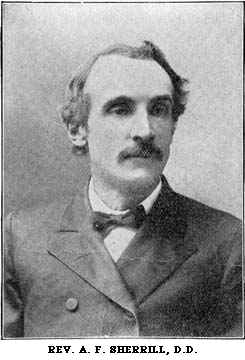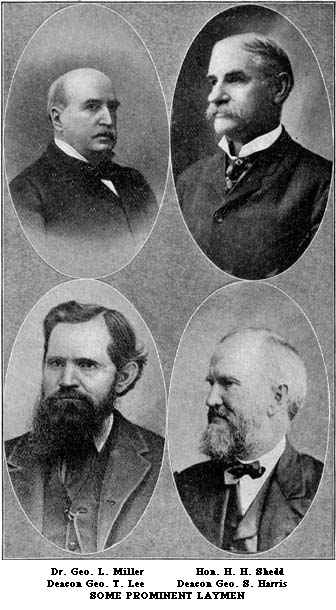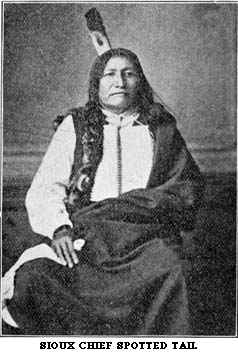
NEGenWeb Project
Resource Center
Church
The state superintendent was then called "the agent," and Mr. Gaylord's field was Nebraska and western Iowa.

He, however, ministered to the First Church in Omaha till the middle of November, when Rev. A. D. Stowell assumed the pastorate, which he held only a few months,
|
GAYLORD AS HOME MISSIONARY SUPERINTENDENT
|
37
|
when he was succeeded by Rev. W. W. Rose, who remained two years. Rev. E. S. Palmer then served the church two years, and after a few months' interval Rev. A. F. Sherrill began his long and successful pastorate, which left its impress for good on the city and state. He was ordained in Omaha in 1870 and remained with the church eighteen years.
It was in 1867 at the Weeping Water meeting that the Secretary of the A. H. M. Society, Rev. Dr. A. H, Clapp, visited the association and greatly encouraged the brethren. The association said: "We have been greatly interested, cheered, and encouraged by the attendance with us at our associational meeting of one of the secretaries of the A. H. M. Society, Rev. A. H. Clapp. This, the first visit of the kind we have ever received, a visit that we expect to be productive of great good to the general cause of home missions in the new state of Nebraska."1
In this period of our work the churches were feeling the need of larger evangelizing forces within the state. The work of the American S. S. Union in part produced this need, for the statement is made that "in Nebraska and southwestern Iowa more than two hundred and fifty Sabbath schools were organized, comprising over thirteen hundred teachers and more than nine thousand scholars."2
Other denominations were active, but in the rapidly growing state there was work for all. The demand for workers exceeded the supply. We could not ignore our responsibility. We bravely tried to meet it, a responsibility not only for the incoming settlers and their families but for the Indians of the plains as well. We inherited the missionary spirit which moved our fathers to noble deeds in behalf of others.
| 38 |
CONGREGATIONAL NEBRASKA
|
In 1869 the State Association met in Fremont, and Rev. Charles Little, first pastor of the First Congregational Church of Lincoln, was the moderator. This meeting is noteworthy because of two strong appeals in behalf of the Indians within the state. One is to President U. S. Grant; the other to the American Board.
The memorial to the President, though long, is of such historic interest that we reproduce it. It is another illustration of the fact that Nebraska Congregationalists were men of patriotism, strong convictions, and courage.
"To His Excellency, Ulysses S. Grant, President of the United States":
"The General Association of the Congregational Churches of Nebraska, now in session at Fremont, Dodge county, Nebraska, send greeting.
"Honored Sir--Believing that you are heartily interested in the temporal and spiritual interests of Indians; as a religious body in the immediate presence of these Indians, we venture, unasked, to make to you a few suggestions, as to what,--from our standpoint,--seems a practicable, just, and Christian method of dealing with them. You are doubtless aware that a strong political pressure is now being exerted to remove the Indians from our state, and plant them on lands further removed from white settlements; and to this end strong arguments are found in the following facts:
"1st, The Indian reserves in Nebraska are now nearly surrounded by white settlers.
"2d, These reserves embrace some of the best lands in the state, and their opening for the settlement by whites would add somewhat to its wealth, population, and prosperity.
"3d, The Indians are unpleasant neighbors even when at peace.
|
GAYLORD AS HOME MISSIONARY SUPERINTENDENT
|
39
|
"4th, Their national feuds are continually provoking bloody conflicts among themselves, even in the case of those Indians who are located on reserves, and in these quarrels the rights of adjacent white settlers are often too little respected.
"5th, The proximity of the reserve Indians to the white settlements gives a plausible excuse to the wild Indians of the plains to conic within a striking distance of white settlers, thus producing continually a. feeling of distrust and danger, which is very prejudicial to the rapid increase of population through immigration.
"While these facts above stated are indisputable, we would request your careful consideration of the following statements, which we believe to be equally true and indisputable:
"1st, The reasons above given for the removal of the Indians are all the natural results of the heathen character and customs of these uncivilized peoples, aggravated largely, by the vices contracted and exasperations received at the hands of unprincipled white men.
"2d, The vices contracted and exasperations received have been so productive of fatal results, because thus far the motives which have prompted intercourse between the whites and Indians have been so largely of a mercenary and vile character; and because the extreme border settlements are not often a fair representation of the words or manners of our professedly Christian nation:
"3d, If these Indians are now removed for reasons given above, it will be but a short time before advancing immigration will again bring about the same state of affairs, and, with equal force call for another removal.
"4th, It is manifest that might does not make right in our dealing with the Indians any more than with any other people; and as a powerful Christian nation, while giving

|
GAYLORD AS HOME MISSIONARY SUPERINTENDENT
|
41
|
them every just due, we should also manifest such a spirit of true benevolence as to lift them up to a Christian civilization.
"5th, It is a fact that the present position of these Indians is becoming every day more favorable for their evangelization and civilization; and that this work is already being prosecuted with some success among the Omahas, the Pawnees, and some bands of the Sioux.
"6th, It seems possible to obviate almost entirely the difficulties, certainly all the dangers, already spoken of, which by stringent lawes keeping them on their reserves, forbidding all warlike and thieving demonstrations by one tribe n another, and by the occupation of the country by such posts of cavalry as shall form an efficient protection from all evil disposed persons.
"In consideration of these things we ask Your Excellency to pass by all arguments for the removal of these unfortunate. people, based on selfish, territorial, financial, or political reasons.
"We believe that the new system which Your Excellency has recently inaugurated will succeed, if it be supported by a military arm sufficient to awe down the dissatisfied and lawless, and if the policy be held without wavering for a time sufficient to show the reasonable results.
"To this end we pledge ourselves as a religious body to cooperate, so far as we can, in every effort for the evangelization and civilization of these Indians.
"Praying that the Lord would guide Your Excellency to adopt and execute the best plans for the welfare of all races found within the borders of our nation; and that He will keep you and strengthen you to acomplish (sic) all His holy will, with great joy to yourself, and a full assurance of everlasting life; we have the honor to remain,
| 42 |
CONGREGATIONAL NEBRASKA
|
"Your true friends and staunch supporters. In behalf of the General Congregational Association of Nebraska.
"[Signed]
J. B. CHASE, JR.,
"CHARLES LITTLE,
"J. J. HAWTHORN,
Committee."

This same committee, authorized by the association, sent a most earnest appeal to the American Board for missionaries to the Indians, especially the Pawnees in eastern Nebraska.3
|
GAYLORD AS HOME MISSIONARY SUPERINTENDENT
|
43
|
In this appeal to the American Board the committee speaks of the Pawnees as being on their reservation within seventy miles of Fremont to the number of twenty-five hundred, and that one of their number had recently been on the reservation. Mr. Albert Watkins in the article on Nebraska in the Encyclopedia Americana says that the Pawnees ceded all their lands south of the Platte river in 1833, and the rest of their possessions north of the Platte in 1857. It is, however, evident from the minutes of the association that the Pawnees were in 1869 on a small reservation, a part of the larger one north of the Platte. They were removed to the Indian Territory in 1876.
There is one Indian reservation in the northeastern part of the state occupied by the Omahas, 1200 in number, and the Winnebagos, 1100 in number. The lands of the reservation have been allotted to the Indians in severalty, and they are all citizens of the state.4 There is also the Santee agency.
It would he interesting to know how the memorial to President Grant was received, but we have failed to find anything hearing on the matter beyond what is here stated. Nebraska Congregationalists, however, made very plain their position in this whole matter, and stood manfully for the protection of the weaker race, true to the historic spirit of the denomination.
|
© 2002 for the NEGenWeb Project by Pam Rietsch, Ted & Carole Miller |
||||